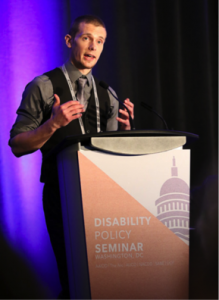Russell Lehmann is an award-winning and internationally recognized motivational speaker, poet, author and advocate who happens to have autism. His words have been featured in the USA Today, LA Times, NPR, Yahoo! News, Autism Speaks and archived in the Library of Congress.
Russell currently travels the country spreading hope, awareness, acceptance, belief and tolerance in a raw and dynamic fashion, while also setting his sights on erasing the stigma and stereotypes that come with having a disability. This week he shared some of his experiences as an autism advocate and poet.
How did you discover it was your calling to be a public advocate?
I wrote a book titled “Inside Out” many years ago. A brief autobiography along with poetry; I was amazed at how many people it helped. Two years ago I thought what better way to reach a wider audience and spread my message of hope and inspiration than by public speaking?
Your website header reads, “I have a disability, but I refuse to let my disability have me!” This speaks to your ability to overcome (or manage) different symptoms of autism, but are there any areas of your life where your autism has helped you succeed in any way?
I always say autism is a gift, it’s just really hard to figure out how to open it first. I utilize MANY beneficial aspects of having autism, such as being quite intuitive and insightful, focusing on matters of substance, which, in turn, eliminates drama from my life, having a very high emotional IQ, etc.
A common symptom of autism is OCD, and I firmly believe that, although it used to consume my livelihood and enslave me, I have managed to turn the tables and use it to my advantage, such as being relentless in my extreme ambition to better this world, and my tenacity to never, ever give up.
What do you find most difficult about living with autism in 2018?
Definitely the stigma. Although I bare my soul in my presentations, writings and on social media so others don’t feel so alone (Facebook Post), there is still so much ignorance in this world. I was recently told in a business dealing that I am “unapproachable”, i.e. that I look like I want nothing to do with people. This is why I titled my book “Inside Out”. What you see on the outside rarely correlates with how I feel on the inside, so just because I’m not smiling, does not mean and I’m not happy, and just because I’m not crying, does not mean I’m not hurting.
The solution to eliminating widespread ignorance? Compassion. Lead with compassion and you can never go wrong.
Your autobiography Inside Out includes some of your poetry. What draws you to writing poetry? Is there another book in the works?
I found that writing poetry was a tremendous way for me to express, digest, and process my feelings. To be able to visually see my feelings on paper, and to be able to hear my emotions when I read my poem out loud, greatly enhances the mind’s capability to dissect the issue at hand and come up with a solution. You can purchase “Inside Out” here.
There is indeed another book in the works–I sent the final draft over to my publisher last week. It will hopefully be released in mid 2018.
What do you tell people who are depressed and haven’t developed the perseverance and confidence that you have to know that life will get better?
I still suffer from severe depressive episodes, and I always will; however, I would not nearly be the man I am today if it wasn’t for all the pain I’ve been through, and all the lessons learned and insights gained from that pain. This life is tough, the question is: Are you tougher? Let me answer that for you: Yes, you are. The only failure lies in not trying, and believe me when I say we are all trying out here.
During my travels I always tell kids and their parents that life may not get easier, but it will get better. The secret is you just have to believe it will! (Facebook Video)
What mistakes do well-intentioned, neurotypical autism advocates make?
From my personal experience, sympathizing. When I hear people tell me “It’s alright, I’ve had a bad day too”, I feel that it minimizes my struggles. I don’t have bad days, I either have a great day or an absolutely horrific day. I can’t explain the pain I go through on a weekly basis, but I would not wish it on anyone. It’s a beast. (Facebook Video)
When I reach out for comfort, instead of trying to identify with me, all I need is for you to listen. Just lend your ear, heart and soul. No words needed.
What are the most important ways your parents, teachers, or friends have helped support you so that you could develop a positive, autistic identity?
I have to say that I LOVE having autism. What a ride it has been, a lot of ups and many downs, and I’m finally learning to just sit back and enjoy it.
I love the man I turned out to be, and aside from my extremely hard work and perseverance, I would not be who I am today if those closest to me did not accept me for who I am. I can’t tell you how crucial unconditional love and support is. I was always taught to follow my heart and to be myself, no matter what others may think of it.
BE YOURSELF. You were given this life for a reason, don’t let it go to waste!
“What you leave behind is not what is engraved in stone monuments, but what is woven into the lives of others.”
– Pericles
Follow Russell’s journey by liking his Facebook Page, and following him on Twitter and Instagram.
Learn more about Russell by visiting his website: The Autistic Poet.

